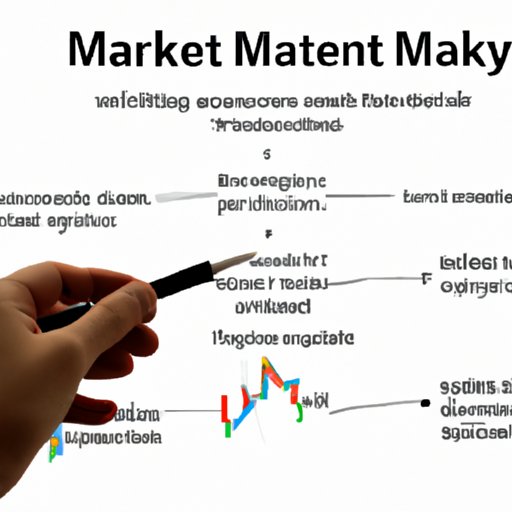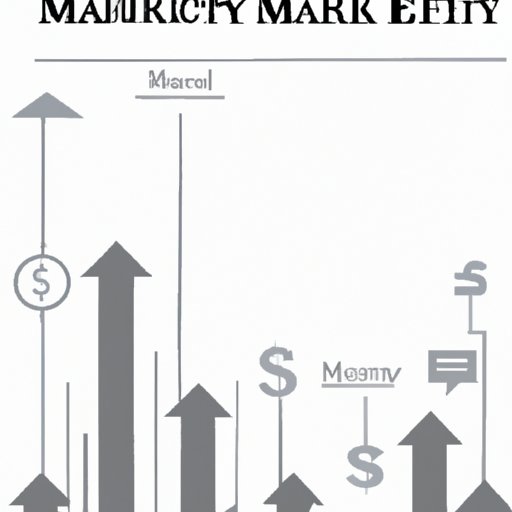Introduction
Market efficiency is an important concept in finance that describes how well a financial market operates. It is used to measure how efficiently resources are allocated within a financial market and whether or not investors are able to make informed decisions based on available information. Market efficiency is often used to assess the level of competition in a given market and determine whether or not the market is operating efficiently.

Explaining Market Efficiency in Finance: What Investors Need to Know
The concept of market efficiency has been around for centuries. In modern times, it is widely used by financial professionals to evaluate the performance of financial markets and assess the impact of various economic factors on the markets. Market efficiency is particularly important for investors, as it can help them make better investment decisions.
Assessing the Benefits of Market Efficiency
One of the primary benefits of market efficiency is that it can increase liquidity and depth in markets. When markets are efficient, buyers and sellers are able to transact quickly and easily, which means that there is less risk associated with trading in these markets. Additionally, market efficiency can reduce risk and volatility. By increasing liquidity and reducing transaction costs, market efficiency can help stabilize asset prices and reduce the chances of large price swings.
Analyzing the Drivers of Market Efficiency
There are several key drivers of market efficiency. One of the most important drivers is the availability of information. Markets tend to be more efficient when there is ample information available to investors. The quality of the information is also important, as investors need to have reliable data in order to make informed decisions.
Understanding the Role of Information in Market Efficiency
Information plays a critical role in market efficiency. Without access to reliable and timely information, investors may be unable to accurately assess the value of assets and make sound investment decisions. This can lead to inefficient markets and higher levels of risk. As such, it is essential for investors to have access to accurate and up-to-date information in order to make informed decisions.
Analyzing the Benefits of Market Efficiency in Financial Markets
Market efficiency can have a significant impact on financial markets. By increasing liquidity and depth in markets, market efficiency can make it easier for investors to enter and exit positions quickly and easily. This can also lead to lower transaction costs, which can benefit both buyers and sellers. Additionally, market efficiency can reduce risk and volatility, which can make investing in financial markets less risky.
Increasing Liquidity and Depth in Markets
One of the most important benefits of market efficiency is that it can increase liquidity and depth in markets. When markets are efficient, buyers and sellers are able to transact quickly and easily, which can lead to lower transaction costs and more efficient trading. Furthermore, markets with high levels of liquidity and depth are more attractive to investors, which can lead to higher levels of capital flowing into the market and increased opportunities for profit.
Reducing Risk and Volatility
Another benefit of market efficiency is that it can reduce risk and volatility. By increasing liquidity and reducing transaction costs, market efficiency can help stabilize asset prices and reduce the chances of large price swings. This can make markets less risky and more attractive to investors. Additionally, market efficiency can help reduce the cost of hedging against potential losses, which can further reduce risk and volatility.
Providing More Accurate Pricing
Finally, market efficiency can help provide more accurate pricing for assets. When markets are efficient, buyers and sellers have access to accurate and up-to-date information, which can help ensure that assets are priced accurately. This can lead to more effective trading, as investors can be confident that they are paying a fair price for assets.
Examining the Different Types of Market Efficiency in Finance
There are three main types of market efficiency in finance: weak-form efficiency, semi-strong form efficiency, and strong-form efficiency. Each type of market efficiency has its own set of characteristics and implications for investors.
Weak-Form Efficiency
Weak-form efficiency is the simplest form of market efficiency. It states that past price movements cannot be used to predict future price movements. This means that no trading strategy based on past price movements will be able to consistently outperform the market. Weak-form efficiency is typically associated with markets that are highly liquid and have low transaction costs.
Semi-Strong Form Efficiency
Semi-strong form efficiency is more complex than weak-form efficiency. It states that publicly available information can be used to predict future price movements. This means that trading strategies based on public information may be able to outperform the market. Semi-strong form efficiency is typically associated with markets that have high levels of liquidity and depth.
Strong-Form Efficiency
Strong-form efficiency is the most complex form of market efficiency. It states that all available information, including private information, can be used to predict future price movements. This means that trading strategies based on any type of information may be able to outperform the market. Strong-form efficiency is typically associated with markets that are highly regulated and have low levels of liquidity.

Understanding Market Efficiency and Its Impact on Investment Strategies
Market efficiency can have a significant impact on investment strategies. It is important for investors to understand how market efficiency affects their trading strategies in order to maximize their returns. Additionally, investors should consider the role of technical analysis and fundamentals when evaluating market efficiency.
How Market Efficiency Affects Trading Strategies
Market efficiency can significantly affect trading strategies. When markets are efficient, it is difficult for investors to consistently outperform the market. This means that investors should focus on strategies that seek to capture broad market returns rather than trying to beat the market. Additionally, investors should be aware of the risks associated with trading in inefficient markets.
The Role of Technical Analysis in Market Efficiency
Technical analysis can be used to assess the level of market efficiency. By analyzing price trends and other indicators, investors can gain insight into whether or not a market is efficient. This information can then be used to inform trading strategies and identify potential opportunities.
Considering Fundamentals when Evaluating Market Efficiency
Fundamental analysis can also be used to assess market efficiency. By examining the underlying factors that influence asset prices, investors can gain insight into whether or not a market is efficient. This information can then be used to inform trading strategies and identify potential opportunities.

Evaluating the Role of Market Efficiency in Financial Markets
Market efficiency can have a significant impact on financial markets. It is important for investors to understand how market efficiency affects market structure, asset prices, and portfolio management in order to make informed investment decisions.
The Impact of Market Efficiency on Market Structure
Market efficiency can have a significant impact on market structure. When markets are efficient, they tend to be more competitive and have lower barriers to entry. This can lead to greater liquidity and depth in markets, which can benefit both buyers and sellers. Additionally, efficient markets tend to be more transparent, which can help ensure that investors have access to accurate and up-to-date information.
Examining the Effects of Market Efficiency on Asset Prices
Market efficiency can also affect asset prices. When markets are efficient, asset prices tend to reflect the intrinsic value of the assets. This can help ensure that investors are able to accurately assess the value of assets and make sound investment decisions. Additionally, efficient markets tend to be more stable, which can help reduce the risk and volatility associated with investing in financial markets.
Applying Market Efficiency to Portfolio Management
Finally, market efficiency can be applied to portfolio management. By understanding how market efficiency affects asset prices, investors can develop better portfolio management strategies. Additionally, investors should consider the role of technical analysis and fundamentals when evaluating market efficiency. This can help ensure that portfolios are optimized for maximum returns.
Conclusion
In conclusion, market efficiency is an important concept in finance that can have a significant impact on financial markets. It can increase liquidity and depth in markets, reduce risk and volatility, and provide more accurate pricing. Additionally, there are three main types of market efficiency: weak-form efficiency, semi-strong form efficiency, and strong-form efficiency. Market efficiency can also affect trading strategies, technical analysis, fundamentals, market structure, asset prices, and portfolio management. By understanding market efficiency and its implications, investors can make better investment decisions.
(Note: Is this article not meeting your expectations? Do you have knowledge or insights to share? Unlock new opportunities and expand your reach by joining our authors team. Click Registration to join us and share your expertise with our readers.)
